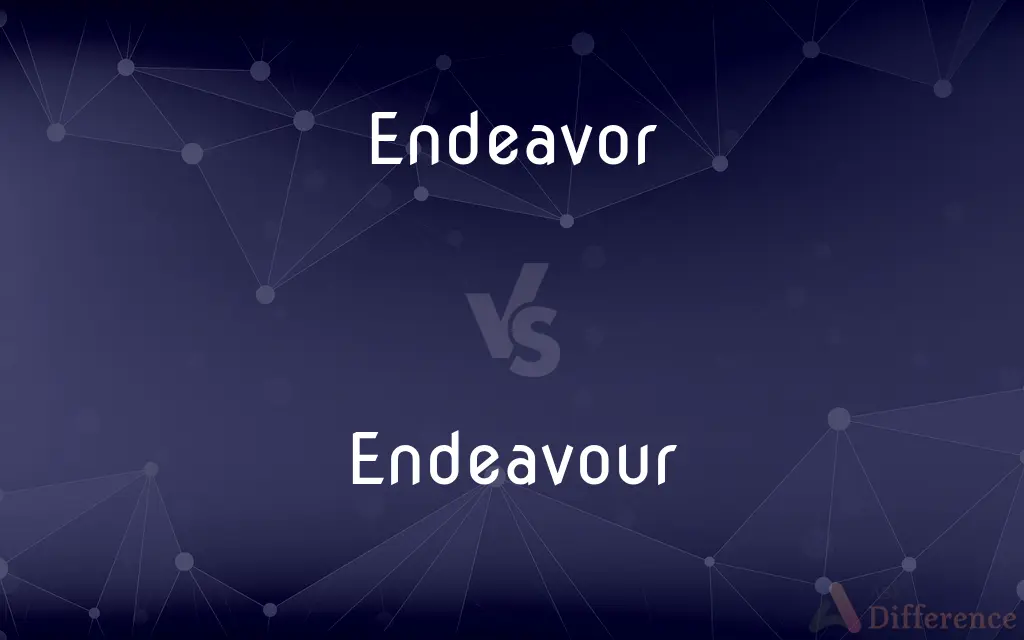Endeavor vs. Endeavour — What's the Difference?
By Urooj Arif & Maham Liaqat — Updated on March 10, 2024
Endeavor (US) focuses on trying hard to achieve something; Endeavour (UK) is its British spelling, reflecting the same meaning and usage.

Difference Between Endeavor and Endeavour
Table of Contents
ADVERTISEMENT
Key Differences
Endeavor is the American English spelling of the word that denotes a sincere effort or attempt to achieve a specific goal. Whereas, Endeavour is the British English variant, maintaining the same meaning but differing in spelling due to regional linguistic norms.
Both terms are used to describe the act of exerting oneself towards achieving an objective, emphasizing the process rather than the outcome. On the other hand, the choice between "endeavor" and "endeavour" often depends on the audience's regional English preference, ensuring clarity and adherence to local writing standards.
In written and spoken language, "endeavor" is commonly seen in American publications, educational materials, and professional communications. Whereas "endeavour" is preferred in British, Canadian, Australian, and other Commonwealth nations' texts, reflecting the linguistic heritage of these regions.
The use of "endeavor" versus "endeavour" can also influence spelling consistency in documents or projects that target a specific English-speaking audience, ensuring that language use aligns with regional expectations. On the other hand, using the wrong variant might not change the message's meaning but could affect the text's perceived professionalism or regional alignment.
Despite their spelling differences, both terms share the same etymological roots, deriving from the Old French "mettre en deveir," which means to make it one's duty. On the other hand, the evolution of English language spelling standards over time has led to the current distinction, reflecting broader patterns of linguistic divergence between American and British English.
ADVERTISEMENT
Comparison Chart
Spelling
Endeavor
Endeavour
Usage Region
Primarily used in the United States
Primarily used in the UK, Canada, and other Commonwealth countries
Meaning
Attempt or effort towards achieving something
Same as Endeavor
Linguistic Origin
Derived from the Old French "mettre en deveir"
Same linguistic origin as Endeavor
Common in
American publications, educational materials
British, Canadian, Australian publications, educational materials
Compare with Definitions
Endeavor
The process of trying hard to do something.
Every endeavor was made to resolve the issue.
Endeavour
The act of striving towards a goal.
Her endeavour to learn a new language paid off.
Endeavor
The act of striving towards a goal.
His endeavor to become a doctor was inspiring.
Endeavour
A project or activity undertaken.
The team's latest endeavour aims to reduce waste.
Endeavor
A project or activity undertaken.
The research endeavor was a success.
Endeavour
The process of trying hard to do something.
The company's endeavour to expand into new markets is ambitious.
Endeavor
Exertion of physical or mental effort.
The endeavor required significant dedication.
Endeavour
Exertion of physical or mental effort.
The artist's endeavour to create a masterpiece took years.
Endeavor
A serious attempt or effort.
She is making an earnest endeavor to improve her grades.
Endeavour
A serious attempt or effort.
He put forth a great endeavour to win the match.
Endeavor
Purposeful or industrious activity; enterprise.
Endeavour
Try hard to do or achieve something
He is endeavouring to help the Third World
Endeavor
A conscientious or concerted effort toward an end; an earnest attempt.
Endeavour
An attempt to achieve a goal
An endeavour to reduce serious injury
Endeavor
To attempt (fulfillment of a responsibility or an obligation, for example) by employment or expenditure of effort
Endeavored to improve the quality of life in the inner city.
Endeavour
Variant of endeavor.
Endeavor
To work with a set or specified goal or purpose.
Endeavour
(British spelling) endeavor
Endeavor
A sincere attempt; a determined or assiduous effort towards a specific goal; assiduous or persistent activity.
Endeavour
(British spelling) endeavor
Endeavor
(obsolete) To exert oneself.
Endeavour
A purposeful or industrious undertaking (especially one that requires effort or boldness);
He had doubts about the whole enterprise
Endeavor
(intransitive) To attempt through application of effort (to do something); to try strenuously.
Endeavour
Earnest and conscientious activity intended to do or accomplish something;
Made an effort to cover all the reading material
Wished him luck in his endeavor
She gave it a good try
Endeavor
To attempt (something).
Endeavour
Attempt by employing effort;
We endeavor to make our customers happy
Endeavor
To work with purpose.
Endeavor
To exert physical or intellectual strength for the attainment of; to use efforts to effect; to strive to achieve or reach; to try; to attempt.
It is our duty to endeavor the recovery of these beneficial subjects.
Endeavor
To exert one's self; to work for a certain end.
And such were praised who but endeavored well.
He had . . . endeavored earnestly to do his duty.
Endeavor
An exertion of physical or intellectual strength toward the attainment of an object; a systematic or continuous attempt; an effort; a trial.
To employ all my endeavor to obey you.
Endeavor
A purposeful or industrious undertaking (especially one that requires effort or boldness);
He had doubts about the whole enterprise
Endeavor
Earnest and conscientious activity intended to do or accomplish something;
Made an effort to cover all the reading material
Wished him luck in his endeavor
She gave it a good try
Endeavor
Attempt by employing effort;
We endeavor to make our customers happy
Common Curiosities
Why do "endeavor" and "endeavour" have different spellings?
The different spellings result from the linguistic divergence between American and British English.
Is "endeavor" or "endeavour" used more globally?
"Endeavour" is more commonly used globally, except in the United States where "endeavor" prevails.
Can "endeavor" and "endeavour" be used interchangeably?
Yes, they can be used interchangeably, depending on the audience's regional English preference.
What is the main difference between endeavor and endeavour?
The main difference is spelling: "endeavor" is American English, while "endeavour" is British English.
Do "endeavor" and "endeavour" come from the same linguistic roots?
Yes, both come from the Old French "mettre en deveir," meaning to make it one's duty.
Can "endeavor" and "endeavour" be used as both nouns and verbs?
Yes, both can be used as nouns (the effort) and verbs (to attempt).
Is the pronunciation of "endeavor" and "endeavour" different?
The pronunciation is generally the same, though accents may slightly affect it.
Are there any synonyms for "endeavor" and "endeavour"?
Yes, synonyms include attempt, effort, try, undertaking, and quest.
How does the choice between "endeavor" and "endeavour" affect readability?
Using the appropriate regional spelling can enhance readability and acceptance by the target audience.
Is there a preference for "endeavor" or "endeavour" in scientific writing?
The preference depends on the publication's or audience's regional English standards.
Which variant should I use in academic writing?
Use the variant that aligns with the regional English standards of your audience or publication.
How can I remember which spelling to use?
Remember your audience's location: "endeavor" for American readers, and "endeavour" for British and other Commonwealth readers.
Can using the wrong variant affect the perception of my writing?
Yes, using the wrong variant might affect the regional alignment or perceived professionalism of your text.
Are there any exceptions to the use of "endeavor" and "endeavour"?
No, the use typically follows regional spelling conventions, without exceptions related to meaning or context.
In what contexts are "endeavor" and "endeavour" most commonly used?
They are used in both formal and informal contexts to describe efforts or attempts towards goals.
Share Your Discovery

Previous Comparison
Squozen vs. Squoze
Next Comparison
Unwitting vs. UnwillingAuthor Spotlight
Written by
Urooj ArifUrooj is a skilled content writer at Ask Difference, known for her exceptional ability to simplify complex topics into engaging and informative content. With a passion for research and a flair for clear, concise writing, she consistently delivers articles that resonate with our diverse audience.
Co-written by
Maham Liaqat














































